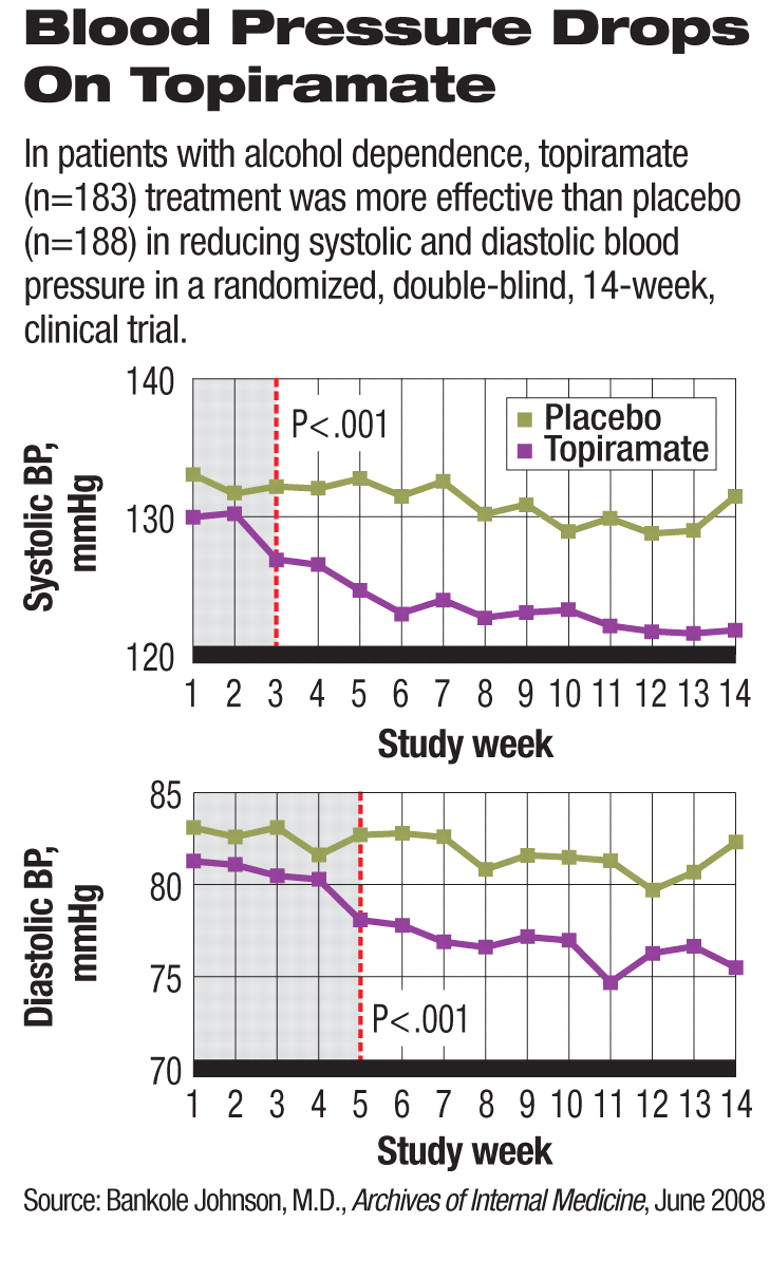Topiramate beat placebo in several physiological and psychosocial indicators in a randomized, double-blind, placebo-controlled, clinical trial of the anticonvulsant's effects on alcohol dependence. The results were published in the June Archives of Internal Medicine.
Among the 371 participants with a DSM-IV diagnosis of alcohol dependence, those who received treatment with topiramate for 14 weeks had significantly greater reduction in liver enzyme levels, cholesterol levels, blood pressure, and body mass index. The active medication also brought about greater improvement than placebo in obsessional thoughts and compulsions about drinking, overall clinical evaluations, and some aspects of quality of life. The general mood assessment did not differ significantly between the two groups.
All participants, regardless of the assigned treatment, received a 15-minute behavioral treatment session every week that reinforced the importance of adherence to prescribed medication.
The 17-site study was conducted by the Topiramate for Alcoholism Study Group and funded by Ortho-McNeil Janssen, which is developing the drug for the possible indication of treating alcoholism.
More participants in the placebo group completed the 14-week trial than those in the topiramate group (76.6 percent versus 61.2 percent, respectively). The difference was mostly driven by more people on topiramate who dropped out of the trial because of side effects (18.6 percent) compared with those on placebo (4.3 percent). The most common adverse effects reported in the study that occurred significantly more often in the topiramate group included tingling or numbness in the skin, altered taste, fatigue, loss of appetite, difficulty with concentration or attention, and nervousness.
The same researchers previously reported the efficacy outcomes of this trial related to heavy drinking and abstinence in the October 10, 2007, Journal of the American Medical Association (Psychiatric News, November 16, 2007). That analysis showed that topiramate was more effective than placebo in reducing heavy drinking days and increased the duration of abstinence in the 14 weeks of treatment.
“Long-term heavy drinking has been associated with elevated lipid levels and the development of fatty liver disease,” the authors wrote in the publication. The improvement in lipid profiles and liver function test results seen in the topiramate-treated group may “add considerably to its general medical utility in treating alcohol-dependent individuals,” they suggested.
“Previous studies of alcohol-dependence treatment focused on drinking-related outcomes, but this study shows that topiramate actually leads to physical and psychosocial improvements,” Bankole Johnson, M.D., Ph.D., chair of the Department of Psychiatric Medicine at the University of Virginia and a member of the APA Council on Addiction Psychiatry, commented to Psychiatric News. He is the lead author of the study.
It is unknown whether the effects of topiramate on physical health indicators were entirely due to reduced drinking or an additional, direct physiological mechanism. “We don't know whether there is an independent effect, but it is possible, because topiramate does have some effect on [body] weight,” Johnson noted.
He emphasized that the improvement in patients' quality of life demonstrated in the study is a meaningful lesson for future research and clinical practice on treatment of alcohol dependence.
“This [outcome] has not been well documented in other medication studies,” he said. “Once you get people into treatment, the quality of life improvement is very important to the long-term success of the treatment.”
An abstract of “Improvement of Physical Health and Quality of Life of Alcohol-Dependent Individuals With Topiramate Treatment” is posted at<archinte.ama-assn.org/cgi/content/short/168/11/1188>.▪

